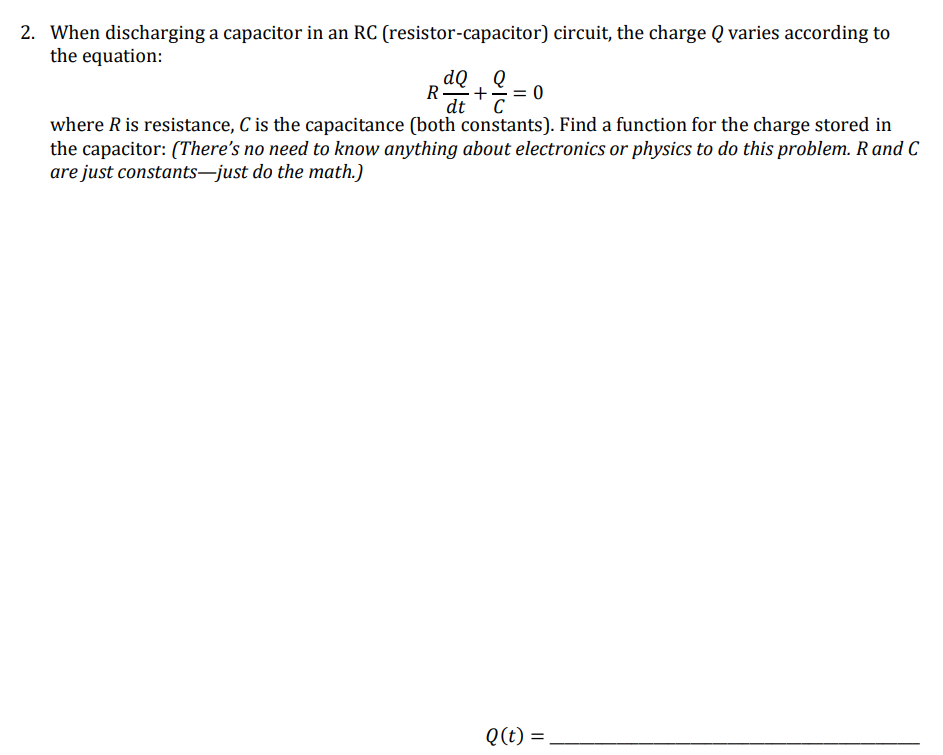2. When discharging a capacitor in an RC (resistor-capacitor) circuit, the charge Q varies according to the equation: dQ . Q R. + dt ' C where R is resistance, C is the capacitance (both constants). Find a function for the charge stored in the capacitor: (There's no need to know anything about electronics or physics to do this problem. R and C are just constants-just do the math.) Q(t) = %3D
2. When discharging a capacitor in an RC (resistor-capacitor) circuit, the charge Q varies according to the equation: dQ . Q R. + dt ' C where R is resistance, C is the capacitance (both constants). Find a function for the charge stored in the capacitor: (There's no need to know anything about electronics or physics to do this problem. R and C are just constants-just do the math.) Q(t) = %3D
College Physics
1st Edition
ISBN:9781938168000
Author:Paul Peter Urone, Roger Hinrichs
Publisher:Paul Peter Urone, Roger Hinrichs
Chapter21: Circuits And Dc Instruments
Section: Chapter Questions
Problem 68PE: A 500- resistor, an uncharged 1.50-F capacitor and a 6.16-V emf are connected in series, (a) What is...
Related questions
Question
Differential equation
Please write your explanation and don't use the calculator.
2. When discharging a capacitor in an RC (resistor-capacitor) circuit, the charge Q varies according to
the equation:
?
??
?? +
?
?
= 0
where R is resistance, C is the capacitance (both constants). Find a function for the charge stored in
the capacitor: (There’s no need to know anything about electronics or physics to do this problem. R and C
are just constants—just do the math.)
?(?) = __________________________________________________

Transcribed Image Text:2. When discharging a capacitor in an RC (resistor-capacitor) circuit, the charge Q varies according to
the equation:
dQ , Q
R-
+
= 0
C
where R is resistance, C is the capacitance (both constants). Find a function for the charge stored in
the capacitor: (There's no need to know anything about electronics or physics to do this problem. Rand C
dt
are just constants–just do the math.)
Q(t) =
Expert Solution
This question has been solved!
Explore an expertly crafted, step-by-step solution for a thorough understanding of key concepts.
This is a popular solution!
Trending now
This is a popular solution!
Step by step
Solved in 2 steps with 2 images

Knowledge Booster
Learn more about
Need a deep-dive on the concept behind this application? Look no further. Learn more about this topic, physics and related others by exploring similar questions and additional content below.Recommended textbooks for you

College Physics
Physics
ISBN:
9781938168000
Author:
Paul Peter Urone, Roger Hinrichs
Publisher:
OpenStax College



College Physics
Physics
ISBN:
9781938168000
Author:
Paul Peter Urone, Roger Hinrichs
Publisher:
OpenStax College



Physics for Scientists and Engineers, Technology …
Physics
ISBN:
9781305116399
Author:
Raymond A. Serway, John W. Jewett
Publisher:
Cengage Learning

Glencoe Physics: Principles and Problems, Student…
Physics
ISBN:
9780078807213
Author:
Paul W. Zitzewitz
Publisher:
Glencoe/McGraw-Hill

Principles of Physics: A Calculus-Based Text
Physics
ISBN:
9781133104261
Author:
Raymond A. Serway, John W. Jewett
Publisher:
Cengage Learning